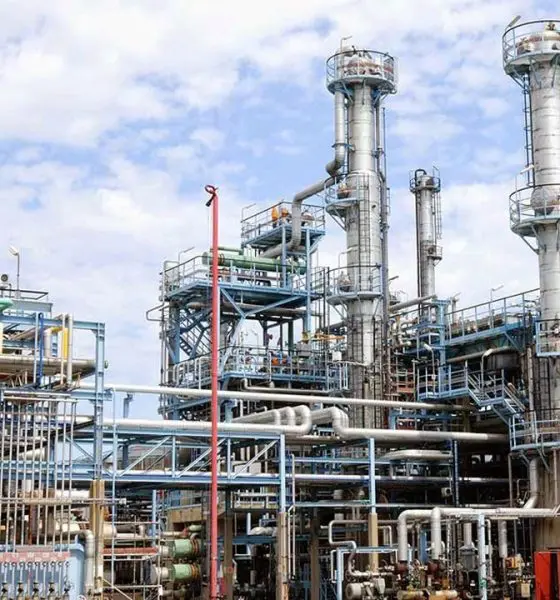
PH REFINERY HALTS OPERATIONS, LOADING BAY EMPTY
The fanfare that greeted the resumption of activities at the Port Harcourt Refining Company on Tuesday may have melted away leaving the hope and expectations of many Nigerians hanging.
A visit by Saturday PUNCH to the refinery on Friday revealed that there was no activity on site, as some workers met by our correspondent claimed that the refinery was undergoing calibration which might last till next week.
The Port Harcourt Refinery has faced numerous delays and missed deadlines to resume operations.
However, the Group Chief Executive Officer of the Nigeria National Petroleum Company Limited, Melee Kyari, inaugurated the new plant at the Area 5 terminal of the refinery on Tuesday. It was claimed that 200 petrol trucks were loading daily from the plant.
However, the announcement was met with skepticism as reports circulated that the trucks were loaded with old products in the storage tanks.
Upon visiting the Port Harcourt Refinery Area 5, our correspondent observed no signs of activity.
An official, who spoke on condition of anonymity, revealed that the loaded trucks contained “dead stock”.
He said, “Before the refinery was shut down between 2015/2016, we had dead stock left in the tank, including some Premium Motor Spirit (petrol) DPK (kerosene), and Automated Gas Oil (diesel).
“So, these products were in large quantities in stores in those tanks. During the rehabilitation of the Port Harcourt Refinery, Old Area 5, those products were evacuated from the tanks for storage.”
However, he noted that the large quantity of refined petrol was “off-spec,” requiring separation from water to obtain the main product in preferred colours.
“But for DPK, it is in large quantity but they have not pushed it from the tank where it was kept after refined ready for commercial purposes.
“So, the product that was loaded was dead stock, that is the old product that was in the system. So, after these dead stocks, they will have to clean the tank, remove all the debris before pumping the new project into that tank, and redye it,” the source said.
The worker highlighted that refineries worldwide should operate electronically, not manually.
“But what they are trying to do at the Port Harcourt Refinery is manual, which cannot match the new digital pumps. Most of the pumps used for the event were refurbished,” he added.
He explained that during Kyari’s visit on Tuesday, seven trucks were prepared for loading, but only five were filled with petrol.
The Chairman of the Independent Petroleum Marketers Association of Nigeria, Taken Ikpaki, while speaking to journalists during the inauguration of the facility on Tuesday, had expressed optimism.
He stated that more trucks were expected to come into the facility to load products in the coming days.
But rather than more trucks coming into the refinery, the number of trucks has dwindled.
Around 1.30pm when our correspondent visited, he observed that most workers and drivers appeared idle as no machinery was operational.
Nine trucks were seen parked, but the loading bay, numbered from one to 18, was empty and deserted, with some workers lying down.
When asked about the lack of loading activity, a worker in overalls said, “They are de-watering, removing the water under the PMS. Maybe there will be loading after that, but we don’t know what time today.
Another worker at the loading bay mentioned that ongoing calibration was the reason for the delay.
“They are calibrating the meters,” he said tersely.
Findings showed that the PMS left in the storage might not be enough to fill five trucks.
A source indicated that calibration would continue until Monday, with the loading of DPK (kerosene) and AGO (diesel) expected to start by then.
Speaking to our correspondent, a resident of Alode in Eleme Local Government Area of Rivers State, who simply identified himself as Osaro, said, “After that ceremony with Mele Kyari where they said the refinery had started operation and loading was taking place, what happened afterwards? They continued loading on air, that is on the pages of newspapers and social media.”
When contacted for his reaction on the lack of activities on Friday, the National Public Relations Officer of the Petroleum Product Retail Outlet Owners Association of Nigeria, Dr Joseph Obelle, said it was as a result of ongoing calibration.
Obelle, the PETROAN spokesman, said, “They are calibrating the loading pumps. They will be done today.”
Meanwhile, it was gathered that the Senate Committee on Petroleum visited the refinery on Thursday on a facility tour. The outcome of the visit had yet to be made public.
Calls and text messages to the spokesperson for the NNPC, Olufemi Soneye, were not replied as of the time of filing this report.
But the NNPC had in a statement denied claims by an Alesa community leader, Timothy Mgbere, that the Port Harcourt refinery was not producing fuel.
Soneye accused Mgbere of crass ignorance of how a refinery runs.
He said, “The old and new Port Harcourt refineries have since been integrated with one single terminal for product load-out. They share common utilities like power and storage tanks. This means that storage tanks and loading gantry which he claimed belongs to the new Port-Harcourt Refinery can also receive products from the Old Port Harcourt Refinery.”
He called on the public to disregard claims borne out of “sheer mischief and blatant display of ignorance.”

